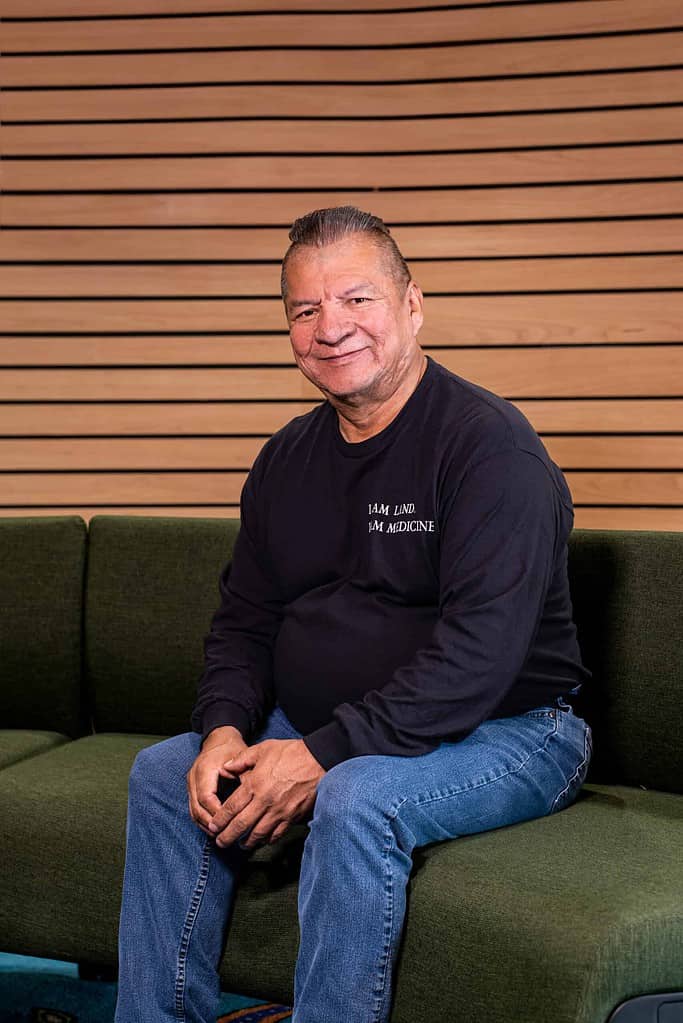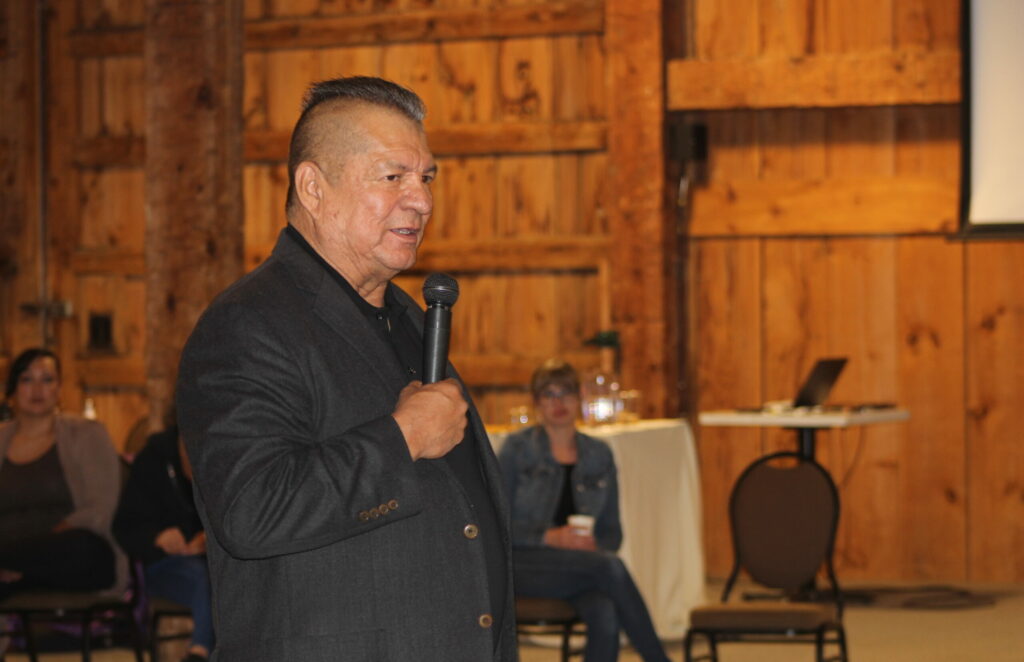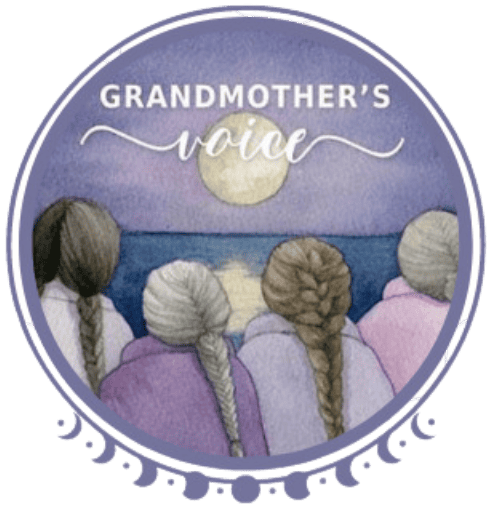GRANDMOTHER’S VOICE PRESENTS
INDIGENOUS WISDOM IN TRAUMA RECOVERY
Land-Based Focusing Oriented Therapy
Certificate Program
January-November 2024 | Milton, ON


Cohort 1 (January-November 2024) | Milton, ON
INDIGENOUS WISDOM IN TRAUMA RECOVERY
Land-based Focusing Oriented Therapy
A SEVEN MODULE CERTIFICATE PROGRAM
We are all connected.
We are all one.
We are all Helpers.
Humanity is at a cross-roads— the red road of harmony and balance with nature and the other of loss and destruction.
Indigenous cultures have ancient traditions that include teachings about cycles of time, interconnectedness, and the importance of living in harmony with the Earth. These teachings are relevant to the challenges faced by the world today, including environmental issues, social conflicts, and a general sense of disconnection.
In recent decades, there has been a growing awareness of Indigenous wisdom and practices among people in the Western world. Many individuals and communities are seeking to learn from Indigenous cultures about sustainable living, holistic health practices, and spiritual wisdom.
When you heal yourself, you help others to heal, and bring healing to the world.
Indigenous Wisdom in Trauma Recovery is a one year training & mentorship program with Elder Dennis Windego, in relationship with Grandmother’s Voice.
The program will be held at Country Heritage Park, Milton, ON, offering an ideal setting for immersive learning.
The program fee is $7,000 + HST.
CERTIFICATE PROGRAM
Embark on a transformative one-year journey, led by Dennis, with 7 modules taught in 3-day blocks from January to November 2024. There will be over 80 hours of theory and practicum, as well as continued support, training and connection among the cohort between module sessions.
MODULE 1. TRAUMA, PTSD, VICARIOUS, INTERGENERATIONAL AND COMPLEX TRAUMA
January 26-28, 2024
You will learn about the impacts and assessments of Complex Trauma within self, family, communities and systems (residential schools, governments, agencies, etc). You will explore the dynamics and interruption of traumatic bonding, Aboriginal treatment models and attitudes for Focusing-Oriented Therapy (FOT), including how to prepare a safe ground for unraveling trauma, vicarious trauma and intergenerational trauma. A variety of Aboriginal /Indigenous treatment modalities are woven throughout the seven certificate courses via experiential exercises, storytelling and ceremonial processes.
MODULE 3. INTERMEDIATE FOCUSING ORIENTED THERAPY AND TRAUMA
May 10-12, 2024
You will learn how to work more deeply with regression, dissociation, and ego states; how to ground people from psychotic breaks and/or out of control emotions; and self-injury from Aboriginal /Indigenous perspectives. The importance of nature and animals in treatment is also introduced. You will continue to practice and deepen your skills in Focusing-Orientated Therapy (FOT). You will deepen your own implicit skills using Aboriginal Indigenous teachings of respectful engagement and balance with all relationships in nature. How Indigenous Knowledge as framework is central to consider when working within Aboriginal contexts will be demonstrated.
MODULE 5. DEPRESSION GRIEVING AND TRAUMA
September 27-29, 2024
You will learn to assess various aspects and complexities of depression and ‘personality disorders’ to determine the best treatment approaches. Suffering, grieving and grief rituals are explored. You will continue to practice and deepen your skills in FOT and start learning how to ‘flush’ complex memory and intergenerational trauma in FOT sessions. Indigenous Knowledge frameworks, ceremony, song and connection to land, geography, seasons and elements will be explored as implicit resource development.
MODULE 7. DREAMS AND TRAUMA
November 15-17, 2024
You will develop skills to connect with dreams and nightmares to help unravel complex trauma, inter-generational trauma, and vicarious trauma. This module will also synthesize FOT theory and skills developed throughout the program. Continue to synthesize and demonstrate Aboriginal Indigenous wholistic values of respectful, responsible, relationships that are reciprocal and reverent.
MODULE 2. BASIC FOCUSING ORIENTED THERAPY AND TRAUMA
March 22-24, 2024
You will consider neurological research and its implications on trauma treatment from Aboriginal Indigenous perspectives. You will learn about the resilience of our brains and bodies to hold and release trauma and how to approach trauma experiences from a Post Traumatic Growth perspective. The Medicine Wheel /Circle are used to demonstrate ways of working with people to recognize and unravel trauma and basic Focusing-Orientated Therapy (FOT) therapy techniques are introduced. The importance of building respectful relationships with local Indigenous elders and experience how ceremony is used as a safety containment process will be demonstrated.
MODULE 4. ADVANCED FOCUSING ORIENTED THERAPY AND TRAUMA
June 7-9, 2024
You will learn to identify and practice helping people move through memory, intergenerational, and vicarious flashbacks, and abreactions. You will explore how unresolved current and historical traumas play out in relationships and develop implicit body centered observation skills. You will continue to practice and deepen your skills in FOT and develop implicit body-centered observation skills. Aboriginal /Indigenous creation stories, language, songs, storytelling and the concepts of “gifts” will be addressed where appropriate.
MODULE 6. SPIRITUALITY AND TRAUMA
October 25-27, 2024
This module introduces you to spiritual healing techniques and boundaries for working with complex, intergenerational and vicarious trauma. Whole Body Focusing-Oriented Therapy techniques are also introduced. Aboriginal Indigenous Knowledge cosmology such as ancestral knowledge and connection to ancestors will be explored where appropriate.
Who Should Take This Program?
This program weaves traditional Indigenous wisdom with evidence-based psychotherapy. Healers and Helpers can be found in many sectors of our community:
- Front line workers such as counselors, therapists, social workers, health care, parole officers, police or legal professionals interested in incorporating land-based training and healing methods into their professional or personal practices.
- Corporate leaders looking for practical ways to implement Truth & Reconciliation Calls to Action and improve employee wellness will benefit greatly from this training.
- Individuals on their own healing journey, Indigenous or non-Indigenous.
- Indigenous agency and community therapists such as those working with residential school survivors, addiction cases, or survivors of abuse, neglect, abandonment, or attempted suicide.
- Para-professionals with field experience but lacking formal training
- Thought leaders, change makers, coaches & healers
- Anyone interested in Truth & Reconciliation, decolonization, and healing people and planet through land based teachings
Why Should I Participate In This Program?
- You will learn how to connect psychotherapy that is based on a Western paradigm to an Indigenous spiritual paradigm that will help people move forward in their lives and towards healing
- You will receive traditional knowledge to create new strategies (we are new people doing traditional things: ceremony, connection to land)
- You will receive the transfer of knowledge as well as the tools, the tips, the practical skills and the cultural permission, appreciation, humility & responsibility from Dennis (Elder) to utilize this training in your own practice
What Is The Approach Used In This Training?
Focusing-Oriented Therapy (FOT) is a body-centered and person-centered approach to healing developed by Indigenous practitioners. FOT allows people total control of the pace and the direction of their healing journey. It is particularly effective in the treatment and healing of complex trauma caused by accidents, sexual, physical, emotional abuse, or neglect. FOT has been especially well received in Indigenous communities because of its humanistic, person-centered approach to healing, which reflects the core values of respect and non-interference.
Observation Component
In the observation component, which is ongoing throughout the program, students will gain experience in how to offer feedback from the perspective of the people, to peers in a professional and constructive manner. As well, students will experience and effectively observe and reflect on the therapeutic process and debrief in clinical supervision sessions.
Clinical Practice And Supervision
This program component will provide students with clinical skills and feedback about their level of practice throughout the program. Students will log and document a minimum of 80 peer therapy sessions as well as attending regular supervision sessions. Students will be evaluated by the course instructor on how they demonstrate the required level of competency through observation of practice, debriefing sessions, and skills demonstrated throughout the program..
What Is Different About This Approach?
This approach encourages sitting beside people and accompanying them, rather than sitting across from them, inviting them to be the subject of their journey rather than a client. Over the last three centuries, Indigenous people have been disempowered; part of the healing process is to give them back their power and invite them to be centered within their journeys.
How Will This Training Equip You To Serve And Support Healing Within Your Community?
The Indigenous Knowledge you will learn in this program is for ALL people.
You will be empowered with Indigenous cultural knowledge, wisdom and a therapeutic model that resonates with all people, including Indigenous and non-Indigenous individuals and communities.
It will also provide you with the tools you need to create safe spaces for individual and communal healing with both Indigenous and non-Indigenous communities, or any community who has experienced trauma.

Meet Your Facilitator: Dennis Windego
Dennis Windego, or Zoongwebines (his Anishinabeg name), comes from the traditional lands of the Nigigoonsiminikaaning First Nation in northwestern Ontario. A member of the Lynx clan, he embodies a decolonizing approach to mental health, addictions, grief, and trauma healing.
Dennis brings over 30 years of experience in one-on-one, family, and group sessions, providing outpatient and land-based treatment across First Nations, Metis, and Inuit communities in Canada.
Dennis’s journey extends beyond therapeutic practice; he is an internationally recognized instructor, currently serving as a Coordinator with the Focusing Institute (New York, NY) where he offers Indigenous Methods for Focusing-Oriented Therapy and Complex Trauma Program- a one-year program for psychologists, counselors, social workers, Elders, traditional healers, and paraprofessionals who work in the field of trauma and addictions with Indigenous peoples and communities affected by colonialism.
Currently working with the Cree Board of Health and Social Services of James Bay (CBHSSJB) in Northern Quebec, Dennis integrates Anishinabeg culture, ceremonies, and psychotherapy to address trauma, addictions, grief, and various forms of childhood trauma.
He has also been a keynote speaker at numerous conferences, sharing his wisdom with judicial, educational, and healthcare professionals. Dennis holds an MSW from Laurentian University and graduated from the community based, BSW (Hons) program through Seven Generations and Carleton University.
A survivor of St. Margaret’s Indian Residential School, Dennis’s personal healing journey, coupled with academic training, informs his mission to guide others through direct and intergenerational trauma. His approach mirrors the lifelong wisdom of his late mother: “Don’t forget who you are and where you come from.”

THIS CERTIFICATE COURSE IS PRESENTED BY GRANDMOTHER'S VOICE
Grandmother’s Voice is a visionary Indigenous organization that aims to unite Indigenous voices while extending a warm invitation to individuals from all directions.
With deep reverence for the timeless wisdom carried by Grandmothers, we endeavor to be a source of healing and unity within communities.
Our mission is to revive and amplify these Ancestral insights and values, nurturing them for generations to come.
FAQ
The application process is simple!
Click “Apply Now” and you will be directed to an applications form. Here, you will be asked to provide information about why you want to take this course along with education and work experience. Please allow one week for Dennis to review your application to ensure this course is right for you. If approved, you will be contacted directly with next steps.
The investment for this course is $7,000 plus HST. The investment equates to $1,000 per Module.
This fee includes 21 days (3 days per module) of in-person instruction, supervision for 80 hours of practicum, all course materials, and meals during the in-person segments (light breakfast, lunch, afternoon snacks).
Travel expenses, hotel or other accommodations, and dinners are not included.
Once you have been accepted to the program, you will be required to pay a $500 deposit to reserve your place.
The remainder is due in two equal installments by January 10, 2024 and June 10, 2024.
Please speak to Jody Harbour (jody@grandmothersvoice.com) if you have extenuating circumstances and need to discuss an alternate payment schedule.
Unfortunately, we are unable to offer any refunds if you are unable to complete the program.
However, we can offer an opportunity for you to participate in the following year’s cohort in order to complete the program.
Each session builds upon the previous, so it is essential that participants commit to attending all days of each module. If portions of the lesson are missed, it is the participant’s responsibility to learn the missed material from their cohort members.
If an entire Module is missed, the participant will be given an opportunity to attend a future session of that Module.
Awakened Healing is an advanced professional development and training program in Focusing-Oriented Therapy and Complex Trauma, which is particularly effective in working with trauma survivors.
Please note: upon completion of the course, Dennis will provide a certificate as evidence of your participation. Applying for FOT accreditation is the responsibility of each participant.
The Focusing Institute (NY, NY) offers members an international journal publication, The Folio, and continuing education and development opportunities such as annual conferences and various workshops on leading-edge Focusing and other experiential therapies at Focusing Centers worldwide.